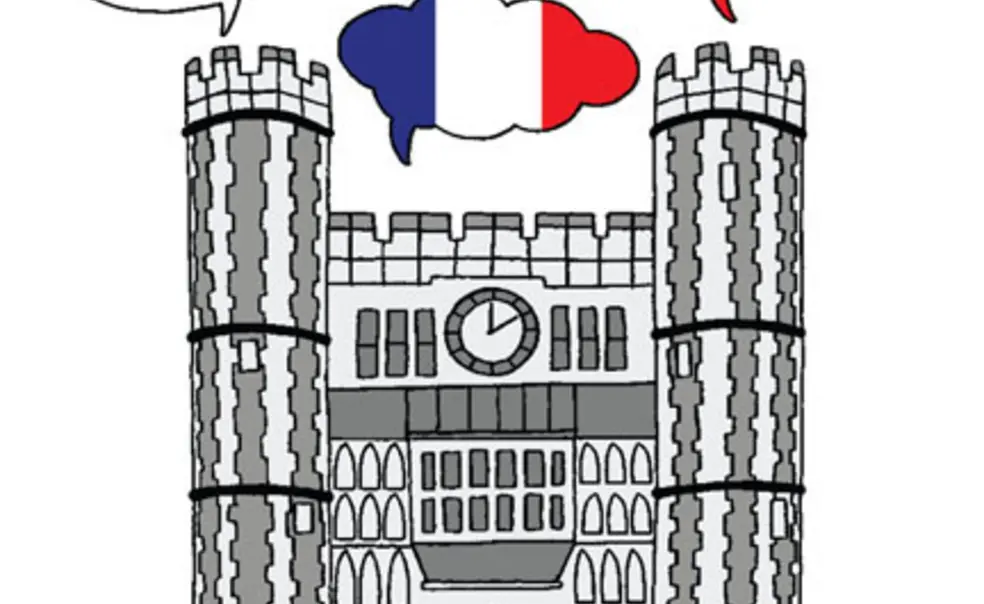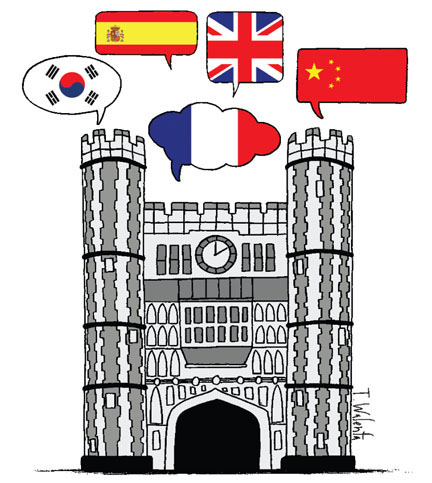On tour, at home and abroad
On a clear day last fall, Kejia Tang ’10 arrived at the admission office at Clio Hall with his usual arsenal of tour-guiding tricks: clever jokes, cute anecdotes, and interesting historical facts. In his second year as an Orange Key tour guide, Tang felt ready to deftly lead his group of visitors around the campus.
This particular day, though, Tang’s usual strategies would fail him as he discovered that his group of visitors did not speak English.
“I had to give a tour in Chinese,” Tang said. It was pure coincidence, he said, that he could speak the visitors’ language, but leading the tour was still very difficult because “it’s hard to translate things off the top of my head.”
In the spring, Tang ran for — and won — the position of Orange Key’s community liaison on a platform of confronting the language barrier that can separate a guide from the group.
“I was browsing the Web site,” Tang said, “and I thought that if we could translate the virtual tour, we could put it online for visitors to see and also use it to help our multilingual guides lead tours.”
Making the University tour available in other languages is particularly important, Tang said, for parents of prospective international students.
“All the students that are going to come here know English, certainly,” he said. “But for international students, it’s not just they who are making the decision, it’s their parents, and for many their English may not be that good.”
Today, a year after Tang’s impromptu Chinese tour, the Orange Key Web site (http://www.princeton.edu/~oktour/virtualtour/) features its virtual campus tour in Spanish, French, Korean, and, thanks in part to Tang, Chinese.
The Princeton University Language Project (PULP), a student organization that provides translation services to nonprofit organizations around the world, offers Orange Key the services of its estimated 30 active student translators and five faculty editors.
PULP president Keisuke Ishihara ’10 said it takes about three months to finish a translation. The group currently is working on tours in Russian, Vietnamese, and Arabic.
“The fact that we can do translations in so many languages really represents the students’ diversity,” Ishihara said.
“We are always supportive of having a broader reach for Princeton,” said admission dean Janet Rapelye. “We look forward to working with the students as they make the tours more accessible to families of diverse backgrounds.”
By Nikki Leon ’11
The Princeton University Orchestra, which has toured internationally every other year since 1994, is preparing for a trip to Prague, Munich, and the Czech Re-public city of Plzen during intersession in January. But with the decline in the dollar and soaring travel costs, funds are tight: “I’m a little worried about this one,” director Michael Pratt says.
Compromises already have been made. The orchestra will spend some nights in a hostel, rather than a hotel, and it will not play the Rudolfinum, one of Prague’s most celebrated and pricey venues, as it did previously.
Although the orchestra receives University funding and grants from organizations like the Edward T. Cone [’39 *42] Foundation, tours are expensive — nearly $146,000 in 2007 — and are paid for mostly by students. In 2007, 90 members toured and contributed more than $102,000. While Pratt says orchestra tours among Princeton’s peer institutions often are student-funded, he also looks to concert revenue and alumni donations to defray costs. In 2007, funds from alumni offset about 11 percent of the total cost.
Pratt maintains that visiting the cities of the great composers is essential to any musician’s growth. “To walk those streets changes your perceptions,” he says. “You come back, and the music is just not the same for you.”
Will Sullivan ’09, who plays the viola, found that “literally everything” on the 2007 trip — which included a visit to Vienna — from the “audiences in the state opera” to “the paintings in the Kunsthistorisches Museum” helped “contextualize the music we all toil away at the rest of the year.”
Nevertheless, Sullivan imagines that costs could make some students think twice: “It’s hard to feel entirely comfortable asking [your parents] for money on top of the already-expensive Princeton experience.” This year, members have been asked to contribute $1,699 if they can.
Pratt hopes that administrative and alumni funding will help the orchestra meet the current cost. “We have never yet left anybody at home because they couldn’t afford to go,” he says. “I’d rather not go before I did that.”













No responses yet